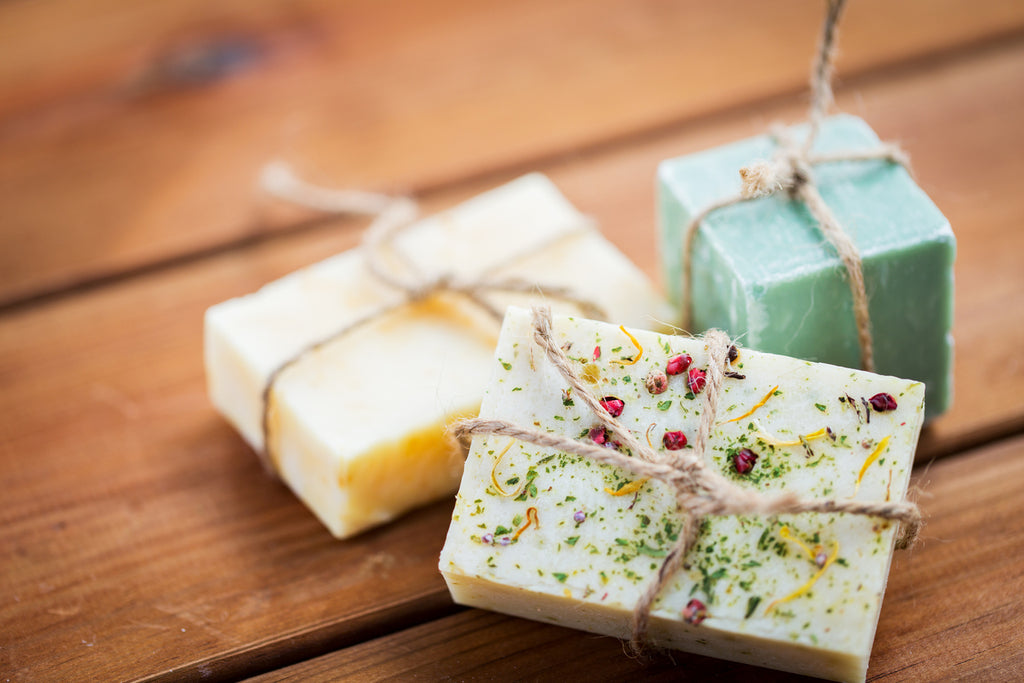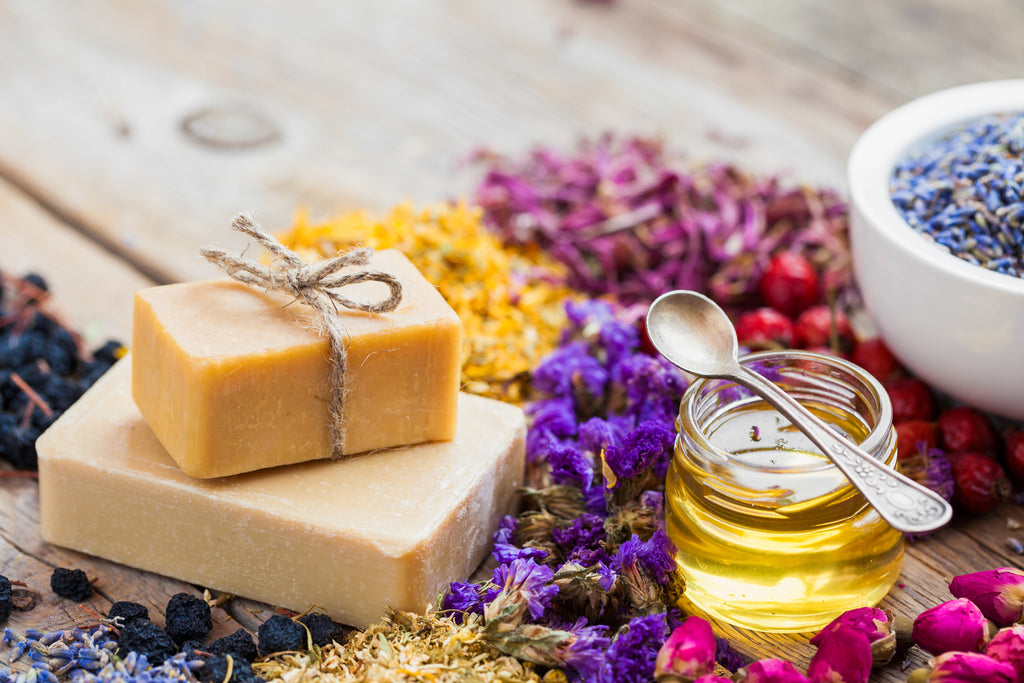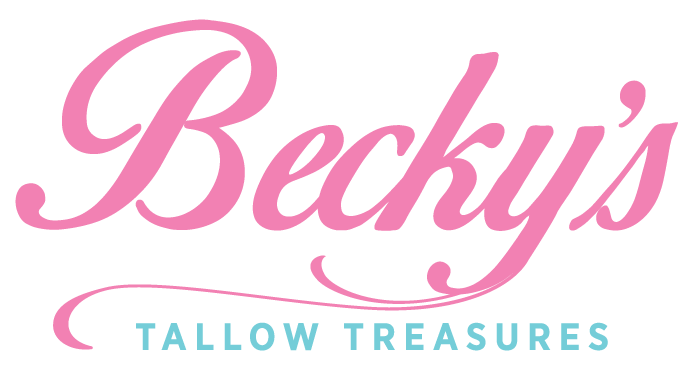
Why is genuine, authentic, real soap – created via the mixing of fats or oils with an alkali base – almost always preferable to a glycerin melt-and-pour style soap? To explore this question, we'll first learn a bit about saponification: the long and fancy word used to describe the primary chemical reaction of soap making. Along the way, we'll dispel some common myths and misunderstandings, and provide all the information that you'll need to make your own intelligent choices.
Saponification: The Alchemy Of Soap-Making
As mentioned above, the primary chemical reaction involved in the making of real soap is known as "saponification." This comes from the root word "sapo" -- which is Latin for "soap." So saponification literally means "turning into soap."
Saponification is an exothermic reaction (meaning that it gives off heat) that happens when fats or oils (i.e. fatty acids) come into contact with the alkali base of lye. Once the lye and the fats/oils have been mixed and the raw soap has been poured into the mold, the saponification process typically takes 24-48 hours to complete.
In simple terms, the saponification process can be represented via this equation:
Fats/oils + lye (dispersed into water) = soap + glycerin
Looking closely at this equation can help us to dispel two common myths:
1. The first myth is that traditionally-made soap does not include glycerin. The truth is that since glycerin is a natural byproduct of this chemical reaction, all true soap is glycerin soap!
2. The second myth is that traditionally-made soap has lye as one of its ingredients. The truth is that while lye is used to catalyze the chemical reaction required to produce the soap, it is transformed completely in this process – so that the soap itself contains absolutely no lye!
The Magic Of Chemical Transmutation
The formal chemical name for lye is sodium hydroxide, whose shorthand notation is: NaOH. In the saponification process used to create Becky's Tallow Soap, for instance, the Na (sodium) reacts with the tallow (beef fat) to produce sodium tallowate (the tallow soap), with glycerin as a byproduct. And the OH (hydroxide) bonds with another H (hydrogen atom) to produce H2O (water).
So once again, the bottom line here is that the final bar of soap – i.e. the product of this chemical reaction -- contains no lye whatsoever.
The situation is a bit analogous to that of table salt – a common culinary ingredient which (when used in moderation) is perfectly safe for human consumption. But Sodium Chloride (NaCl) – the chemical name for table salt -- is created via the combination of chlorine (Cl) – a poisonous gas – and sodium (Na) – a toxic metal. Even though its two constituents are non-edible, the final product – table salt – is not only perfectly safe but also provides the human body with essential nutrients.
And so it is with the use of lye in the alchemy of soap-making: authentic soap, like common table salt, is perfectly safe – so don't be misled by those who would tell you otherwise.

The Low-Down On Melt-And-Pour Glycerin "Soaps"
Now that we've cleared up two common myths, and understand that authentic soap is 100% lye-free, and naturally contains glycerin; let's learn a bit more about melt-and-pour style glycerin soaps.
As its name implies, a melt-and-pour style soap is made by melting down a block of base material – and then pouring the melted material into smaller soap molds. Between the initial melting and final pouring, a host of other ingredients can be added: dyes for color; fragrances for scent; dried herbs; and all variety of small glittery objects to give the soap a crafty or artistic feel.
Soap v. Detergent
Sometimes the base material of a melt-and-pour glycerin soap contains real soap (created via the saponification process) -- though more frequently these kinds of "soaps" are made mostly of detergent. So what's the difference between soap and detergent?
True soap is made with natural fats and oils (e.g. tallow, coconut oil, olive oil, or palm oil) -- while detergents are synthetic and typically petroleum-based. Most so-called "glycerin soap" is made from a base of detergents, with added preservatives, synthetic fragrances, and artificial dyes. Occasionally you may find a "glycerin soap" base that is true soap; however, there will almost inevitably be chemicals (such as sorbitol and propylene glycol) added to make it possible for such a soap to melt and re-form again.
Makers of melt-and-pour glycerin soaps will sometimes advertise them as being "made without any lye." As it turns out, however, this is a completely hollow claim, for the following reasons:
1. As we've already learned, authentic soap – in its final form – also is completely free from lye.
2. A glycerin soap that contains no authentic (saponified) soap will almost invariably have loads of artificial chemicals.
3. If the base material of the melt-and-pour glycerin soap does indeed include authentic (saponified) soap –- the secondary producers can still claim that their own soaps are made without lye – because the saponification process (using lye) doesn't happen at their own factories. This is kind of like using a boxed cake mix to bake a cake – and then claiming that you yourself "did not use any flour" to make the cake, because the flour didn't come from your own kitchen, but rather from the box that you purchased at the grocery store.
Customizing Your Authentic Soap
What makes the soaps at Becky's Tallow Treasures different from other soaps is the use of organic grass-fed tallow, organic ingredients, and therapeutic essential oils. Also, our ability to customize a facial, bath, or shampoo soap for you goes beyond simply letting you choose your favorite essential oils. In addition, we can customize the soap base itself – creating a mix of oils and/or tallow that perfectly suits your needs. Do you simply adore coconut oil? If so, we can use that in your soap base. Are you allergic to coconut oil? No problem! – we can avoid using this oil in your soap base.
By making our soaps in the traditional way, we can guarantee a perfect consistency (not-too-hard, and not-too-melty) – along with the highest quality natural and organic ingredients. We delight in creating soap products that are genuinely therapeutic and a delight to use.
We look forward to serving you!




Do you suspect your spouse of cheating? Don’t know how to clarify your doubts? Well, you are not alone. It is natural for a partner to feel insecure about their relationship when their significant other isn’t paying them the attention they once did. You would like to know what’s going on with your spouse or partner. More specifically, you want to know for sure whether your spouse is cheating on you before you end up confronting them. Fortunately, there is a way to do so and be completely discreet about it. All you have to do is to hire this hacker called (WIZARD HILTON CRYBER TECH) with good cyber ratings on this forum to help you hack your spouse phone, he’s professional, genuine and reliable. Relay all your problems to him and he’ll help you out I was able to access my cheating partner cellphone in less than 2 hours; Email : wizardhiltoncybertech ( @ ) gmail (. ) com
WhatsApp number +18737715701 thank you.